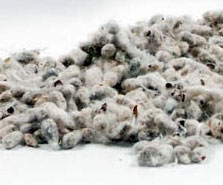 Agriculture Secretary Tom Vilsack has reportedly informed Congress that he has no legal authority to approve a request from cotton growers that cottonseed be designated as an oilseed to qualify for farm programs. The secretary told reporters about the decision Wednesday at the National Association of State Departments of Agriculture meeting in Washington DC.
Agriculture Secretary Tom Vilsack has reportedly informed Congress that he has no legal authority to approve a request from cotton growers that cottonseed be designated as an oilseed to qualify for farm programs. The secretary told reporters about the decision Wednesday at the National Association of State Departments of Agriculture meeting in Washington DC.
In response to press reports, House Agriculture Committee Chairman Mike Conaway (R-TX) argued in a statement that USDA does possess the authority to take the requested action which would help alleviate the financial stress cotton farmers are experiencing with low global prices. “Time and again the Secretary has used the tools made available to him under the law to respond to a crisis in agriculture. The current economic situation for cotton farmers is dire and it warrants the same urgent and meaningful action by the Department,” says Conaway. “The Department has not only the legal authority to designate cottonseed as an ‘other oilseed,’ but the responsibility to act, and I trust that the Secretary is sensitive to the situation and shares my commitment and the commitment of so many others that this matter must be meaningfully responded to in a timely way.”
The National Cotton Council expressed disappointment in the news. “We continue to believe, like a broad group of Members of Congress, that USDA clearly has this authority as described in the current farm bill. Our industry remains committed to pursuing a cottonseed designation and policy to help provide long-term stability to the industry.” The council notes that U.S. cotton acreage is at its lowest level in more than 30 years, exports are the lowest in 15 years and cotton prices at the lowest level since 2009.
Both the American Farm Bureau Federation and the National Farmers Union also expressed similar sentiments. “While we are disappointed in the USDA ruling, AFBF stands ready to work with leadership of the House and Senate Agriculture Committees and other congressional ag leaders to explore ways to overcome the legal barriers USDA has cited,” said AFBF president Zippy Duvall.

